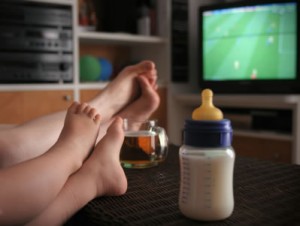
Image: istockphoto
A decade ago, the American Academy of Pediatrics suggested that parents limit TV consumption by children under two years of age. The recommendations were based as much on common sense as science, because studies of media consumption and infant development were themselves in their infancy.
The research has finally grown up. And though it’s still ongoing, it’s mature enough for the AAP to release a new, science-heavy policy statement on babies watching television, videos or any other passive media form.New AAP recommendations say young children should learn from play, not screens.
The temptation to rely on media screens to entertain babies and toddlers is more appealing than ever, with screens surrounding families at home, in the car, and even at the grocery store. And there is no shortage of media products and programming targeted to little ones. But a new policy statement from the American Academy of Pediatrics (AAP) says there are better ways to help children learn at this critical age.
In a recent survey, 90 percent of parents said their children under age 2 watch some form of electronic media.On average, children this age watch televised programs one to two hours per day. By age 3, almost one third of children have a television in their bedroom. Parents who believe that educational television is “very important for healthy development” are twice as likely to keep the television on all or most of the time.
The policy statement, “Media Use by Children Younger Than Two Years,” will be released Tuesday, Oct. 18, atthe AAP National Conference & Exhibition in Boston and will be published in the November 2011 issue ofPediatrics (published online Oct. 18). Read More
Source:American Academy of Pediatrics (AAP)
